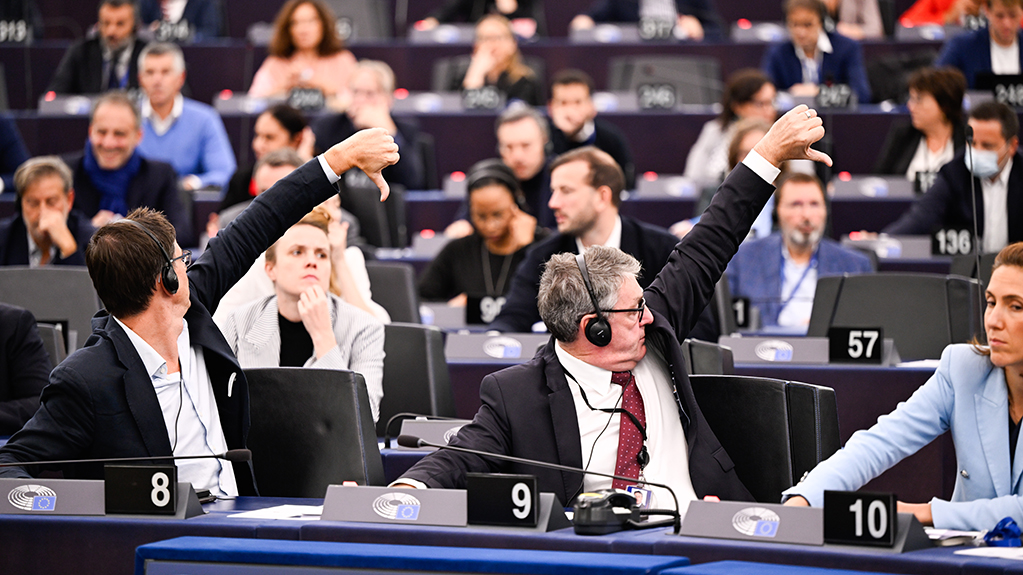The European Parliament is beginning discussions on Georgia today, October 8, with Josep Borrell, the head of the European Union's foreign policy department, addressing the decline of democracy in the country. 7 draft resolutions have been prepared on this topic. The debate and voting on the resolutions will conclude tomorrow.
News
Five of the proposed resolutions largely follow a unified stance: the parliamentarians express concern about the deterioration of democratic processes in Georgia and show solidarity with the Georgian people in their fight for the country’s European future. The draft resolution condemns the illiberal legislation adopted by the ruling party, Georgian Dream, which includes Russian-style laws on Transparency of Foreign Influence and on Family Values and Protection of Minors. It also condemns the cancellation of gender quotas in electoral lists and changes to the rules for forming the Central Election Commission.
The authors of the draft resolution call on the European Union to freeze funding to the Georgian government and impose sanctions on government officials, specifically targeting Bidzina Ivanishvili for his role in undermining the country's political process and human rights situation.
The issue of suspending visa liberalization was also included in the draft resolution. As per the proposal from the European Conservatives and Reformists Group (ECR Group), the suspension of the visa liberalization agreement with Georgia should only be considered after personal sanctions are imposed on members of the ruling party and the "dominant oligarch," Bidzina Ivanishvili.
The resolution prepared by the European People's Party group (EPP group) states that the European Union should consider temporarily suspending the visa-free regime with Georgia if upcoming elections fail to meet international standards or if Georgia’s compliance with visa liberalization criteria is called into question - particularly the criterion of fundamental rights.
As per the same draft resolution, the upcoming elections will be crucial in determining Georgia's future democratic development, geopolitical orientation, and its ability to advance on the EU path.
"The result of the Georgian election should allow the country to return to its pro-Western democratic agenda, implement the necessary reforms and launch accession negotiations with the EU," reads the draft resolution of the European People's Party group.
The resolutions under consideration urge the Georgian authorities to hold parliamentary elections in a transparent, free, and fair manner, ensuring the presence of both local and international observers. In the ECR Group’s draft resolution, concern is expressed over the decision to open only a limited number of polling stations abroad, despite numerous requests from the Georgian diaspora, which deprives the majority of Georgians of the right to vote.
The resolution from the Renew Europe group calls on the European Union and its member states to fully support Georgia's civil society organizations during this difficult period, including in matters related to fines and other burdens imposed on them by the new legislation. The draft resolution condemns the police brutality during the spring 2024 protests and calls for an investigation.
Five of the resolutions under consideration call on the Georgian authorities to immediately release former President Mikheil Saakashvili and allow him to receive proper medical treatment abroad.
One of the submitted resolutions, authored by the Left Group, expresses concern over the decision to suspend financial aid to Georgia. The resolution emphasizes the benefits of visa liberalization and its continuation, as well as the need for constructive dialogue between the Government of Georgia and the European Union. Additionally, the draft resolution responds to a statement by Russian Foreign Minister Sergey Lavrov, in which he referred to Georgia’s occupied territories as "countries." As per the draft resolution, the European Parliament "encourages both sides to undertake solid initiatives in this direction" to resolve the issues in a "peaceful, diplomatic way." The author of this resolution, Danilo Della Valle, is viewed favorably by the Georgian Dream government, and his statements are often covered by pro-government media. However, in the draft resolution, he also criticizes the restrictive civil society, anti-LGBT, and censorship laws adopted by the ruling party in Georgia.
The draft resolution of the European Sovereign Nations Group (ESN group) calls on the European Union to respect the public norms of Georgian citizens and expresses concern over interference in Georgia’s "interference in cultural and societal matters in Georgia, particularly those related to the Orthodox Christian Church and traditional family values." The authors of the resolution argue that claims about Georgia's "democratic backsliding" are without legitimate basis. German and Bulgarian right-wing MPs are united within the ESN group.
"The fact that the issue of Georgia is being discussed in the European Parliament, that the current situation in Georgia is being debated among the foreign ministers of 27 countries, and that it will be discussed among European Union leaders is not a good sign. This means that leaders are concerned. This means that we are worried about the direction of events," said EU Ambassador to Georgia, Pawel Herczynski, regarding the ongoing discussions in the European Parliament.
Herczynski expressed hope that the current state of EU-Georgia relations will change after the elections, regardless of who wins.















